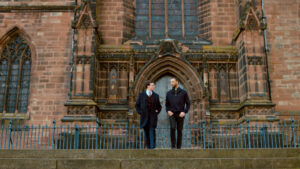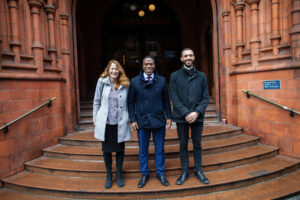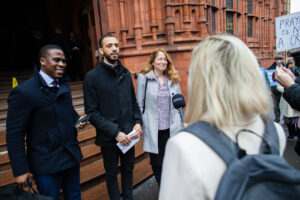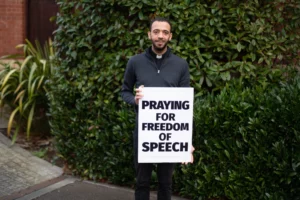Praying for free speech should not be criminalized
- Who: Father Sean Gough
- Where: United Kingdom
- Advocacy Team: Jeremiah Igunnubole, Lois McLatchie
Topic | Freedom of Speech
Are priests still allowed to pray on the streets of Britain?
Father Sean Gough, a Catholic priest, faced a legal battle after he was charged for breaching a censorship zone by silently praying, in addition to holding a sign with the words “praying for free speech,” near a closed abortion facility in Birmingham. Police also charged him for parking his car in the censorship zone which, for many months before the censorship zone was imposed, had a small bumper sticker on it reading “unborn lives matter”.
The area surrounding the facility has been covered by a local Public Spaces Protection Order (PSPO), in force since November 2022, which prohibits prayer, distributing information about pregnancy help services, and other activities considered to constitute “protest”. With our support, the priest was acquitted of all charges in a ruling handed down by Birmingham Magistrates’ Court on 16 February 2023. Nobody should be arrested for peaceful expression – least of all on a bumper sticker. And it isn’t criminal to pray for free speech – a right fundamental to democracy which ultimately benefits us all.
“The process in and of itself has become the punishment for people like Father Sean, who face onerous legal battles simply for holding peaceful views in certain public spaces, against the will of authorities. Nobody should be criminalised for peaceful activities like praying for the state of free speech in our country, or having a simple bumper sticker on their car that expresses a belief that ‘unborn lives matter’”
- Jeremiah Igunnubole, Legal Counsel, ADF UK
Case summary
Father Sean Gough was charged with “intimidating service-users” of an abortion facility, for peacefully supporting free speech within the censorship zone. This was despite the fact that all this happened while the abortion facility was closed.
“I pray wherever I go, inside my head, for the people around me. How can it be a crime for a priest to pray? I often pray in my head near the abortion facility, but when confronted by the authorities, I was praying for free speech, which is under severe pressure in our country today. At all times, I believed my actions to be lawful – freedom of expression, especially when peaceful, is protected in domestic and international law. It is deeply undemocratic to censor public streets, particularly those spaces where we know that many women have benefitted from peaceful offers of help about services available,” said Father Sean Gough.
When police officers initially approached the priest holding the “praying for free speech sign”, they told Father Gough that they did not think that he was breaking rules. However, the priest was later invited for interview at the police station, interrogated on his actions, and eventually criminally charged.
The Crown Prosecution Service subsequently dropped the charges against Father Gough, but made clear that they could be reinstated. Like Isabel Vaughan-Spruce, Father Gough then pursued a clear verdict on his charges in court, in order to clear his name.
Amid several recent cases of individuals facing fines or criminal charges for praying near abortion facilities, Father Gough marks the first where prayer that is not related to abortion, but to free speech, has led to criminalisation.
“This case demonstrates the far-reaching and illiberal consequences of so-called ‘buffer zones’. Father Sean’s years of service to women in crisis pregnancies are testimony to the good of his character and intention,” commented Jeremiah Igunnubole, legal counsel for ADF UK, the organisation supporting Father Sean Gough.
Father Gough volunteers much of his time in service to women in crisis pregnancies.
“A large part of my ministry is working for ‘Rachel’s Vineyard,’ a charity that supports the healing of hundreds of women and men in the UK every year wounded by abortion. I don’t judge or condemn those who have had abortions – but volunteer my time to work for their healing,” he said.
“It’s an issue that means a lot to me because my mom made a bold choice for life when I was a baby. I was conceived in the context of severe violence, and she found the grace and strength to fight for us both. So many people thought she should abort me, but by the grace of God, she didn’t, and we’re both so grateful for that today,” Father Gough continued.





Support Freedom of Speech
Your gift can support fundamental freedoms for courageous people like Father Sean around the world. Thank you for your generosity.
Stay Informed
Get involved! Sign up to receive updates:
"*" indicates required fields
